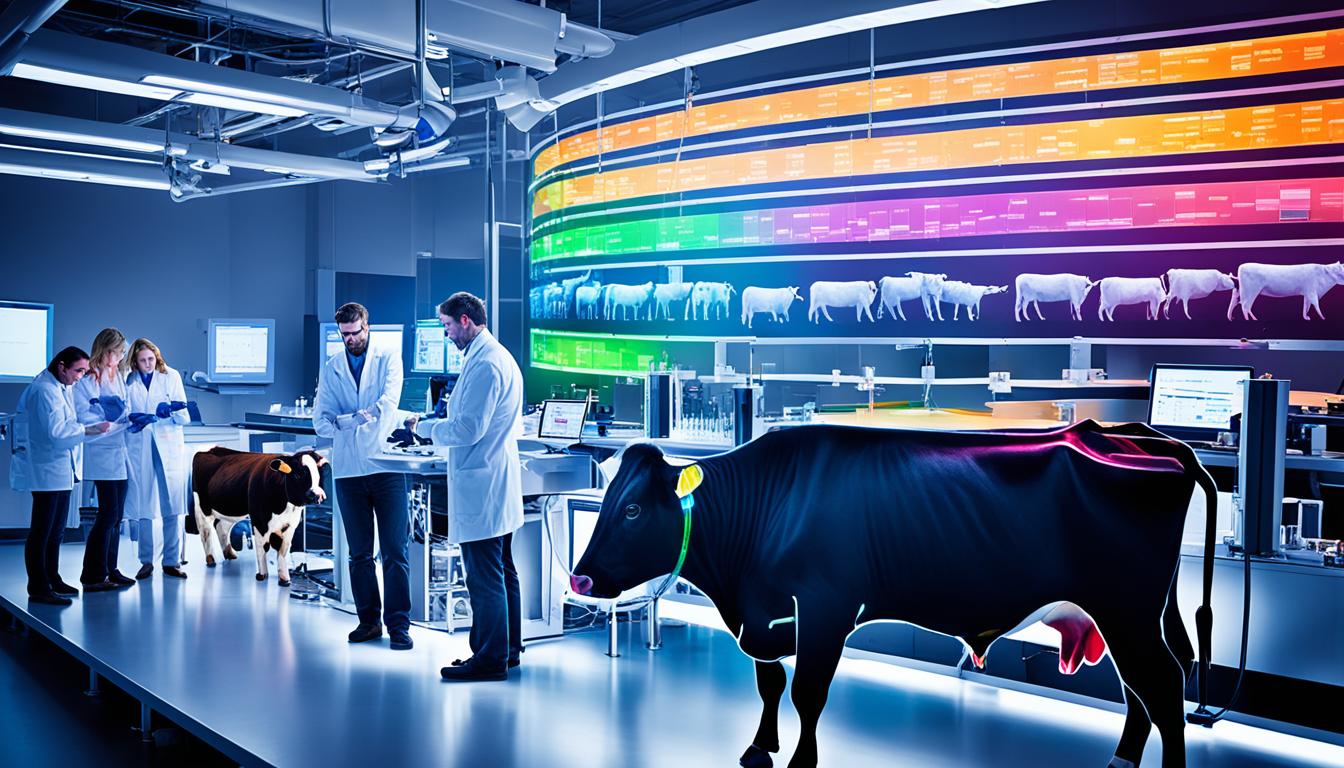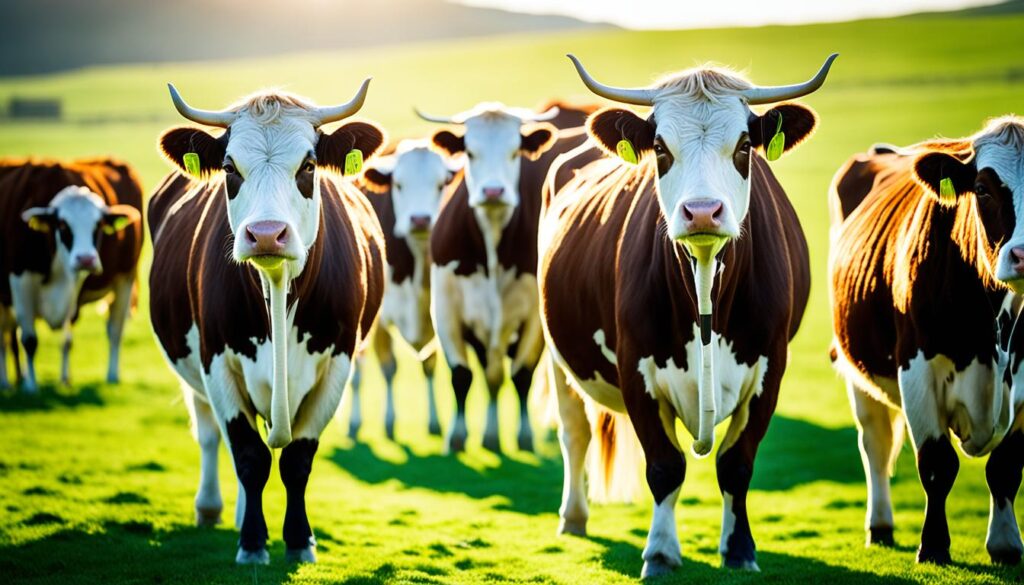Unlocking Cattle Productivity with Genome Projects

How will genome projects contribute to better productivity in cattle? What if we told you that understanding the genetic makeup of cattle can revolutionize farming practices and enhance overall productivity in the cattle industry?
The draft genome sequence of cattle has been analyzed by the Bovine Genome Sequencing and Analysis Consortium and the Bovine HapMap Consortium, involving over 300 scientists from 25 countries. The cattle genome was selected for sequencing due to the unique biology of ruminants, the importance of ruminants as a major source of protein nutrition, and the evolutionary position of cattle. The cattle genome sequence provides insight into mammalian evolution, ruminant biology, cattle breeds, and the impact of domestication. With approximately 3.4 billion domesticated cattle worldwide, genome projects have the potential to revolutionize cattle farming and breeding for better productivity.
Key Takeaways:
- Genome projects in cattle farming have the potential to revolutionize agriculture practices.
- Understanding the genetic makeup of cattle can enhance overall productivity in the cattle industry.
- The cattle genome sequence provides valuable insights into mammalian evolution, ruminant biology, and the origins of cattle breeds.
- Genomic tools and advancements in genetics research can optimize breeding practices and increase cattle productivity.
- Genomics plays a crucial role in achieving sustainable cattle farming, improving environmental and economic sustainability, and animal well-being.
The Significance of Genome Projects in Cattle Farming
Genome projects in cattle farming hold immense significance for the industry, offering valuable insights and tools that can drive improvements in productivity and genetics research. The analysis of the cattle genome sequence has filled an evolutionary void among mammalian genome sequences, allowing for a better understanding of the genetic similarities and differences between various mammalian groups.
Comparative analysis of the cattle genome with other mammalian genomes provides crucial information on genome organization, paralogous gene families, and economically essential adaptive traits specific to ruminants. These traits include lactation, metabolism, reproduction, and disease resistance, which directly impact cattle productivity.
With the information obtained from genome projects, researchers and farmers can develop and deploy genomic tools to enhance cattle productivity. These tools leverage advancements in genetics research to identify and select animals with desirable genetic traits. By selectively breeding cattle with higher genetic potential, farmers can improve productivity and overall herd performance.
Through the application of genomic tools and insights gained from genome projects, the cattle industry can achieve significant advancements in genetics research. This, in turn, leads to better breeding practices, disease resistance, and improved overall productivity. The integration of genomics into cattle farming allows for more targeted and efficient approaches to breeding, resulting in healthier and more productive cattle herds.
Advancements in Genomic Tools for Cattle Productivity
The advancements in genomic tools have revolutionized cattle farming by enabling farmers and breeders to make more informed decisions in their breeding programs. By analyzing the genetic information encoded in the cattle genome, researchers can identify specific genes or markers associated with desirable traits and use this information to select breeding candidates with higher genetic potential.
One significant development is the utilization of genomic selection technology, which involves the analysis of DNA markers across the entire cattle genome. By genotyping animals and analyzing their genetic profiles, farmers can predict various traits such as fertility, meat quality, and disease resistance. This allows them to make informed decisions when selecting animals for breeding, ultimately improving the genetic composition of their herds and increasing overall productivity.
Furthermore, large-scale genotyping and data collection efforts have been conducted to build comprehensive datasets for predicting various traits in cattle. These datasets provide a robust foundation for breeders to make accurate genetic selections and optimize breeding programs for productivity and desired traits.
The Impact on the Cattle Industry and Genetics Research
The integration of genome projects in cattle farming has a profound impact on the cattle industry and genetics research. By understanding the genetic makeup of cattle, researchers can better comprehend the underlying mechanisms behind economically important traits and make targeted improvements. This knowledge can drive advancements in breeding programs, disease prevention, and overall herd management.
The significance of genome projects in cattle farming extends beyond productivity and breeding. It also aids in improving animal welfare, reducing the environmental footprint of the industry, and ensuring the sustainability of cattle farming practices.
The insights provided by genome projects allow farmers and breeders to optimize management practices, adapt to changing climates, combat diseases, and enhance the well-being of their animals. By making informed decisions based on genomic information, the cattle industry can improve production systems, reduce resource consumption, and meet the evolving demands of consumers.
Genome projects in cattle farming have the potential to revolutionize the industry by unlocking the vast genetic potential of cattle herds and enhancing overall productivity. Through the development and deployment of genomic tools, advancements in genetics research, and a better understanding of the cattle genome, the industry can continue to progress towards sustainable and efficient cattle farming practices.
| Impact of Genome Projects in Cattle Farming | Benefits |
|---|---|
| Enhanced cattle productivity | Improved breeding selection for desirable traits |
| Economic sustainability | Increased efficiency in production systems |
| Environmental sustainability | Reduced resource consumption and greenhouse gas emissions |
| Animal welfare | Improved well-being and health management |

Genetic Improvement in Cattle Production
Genomic selection technology, using DNA markers across the cattle genome, has revolutionized the way genetic improvement is achieved in cattle production. By harnessing the power of genomics, farmers can enhance cattle productivity and breeding outcomes through targeted selection based on specific genetic traits.
One of the key areas where genetic improvement has been made possible is in cattle fertility. Using genomic selection, farmers can now identify young bulls and heifers with DNA profiles indicating high fertility genetics. This allows them to selectively breed animals that are more likely to produce a greater number of calves over their lifetime, thereby enhancing overall productivity in cattle production.
Not only does genetic improvement in cattle production lead to increased productivity, but it also has potential environmental benefits. By selecting animals with favorable genetic traits, such as improved fertility, farmers can contribute to the reduction of methane emissions per kilogram of beef. This plays a significant role in improving the sustainability of the cattle industry, a crucial aspect in today’s environmentally conscious world.
To achieve genetic improvement in cattle production, large-scale genotyping and data collection efforts have been undertaken. These efforts aim to build comprehensive datasets that allow for the prediction of various traits, including fertility, based on an animal’s genetic makeup. The availability of such data enables farmers to make informed decisions when selecting animals for breeding, thus further enhancing the genetic improvement process.
Advancements in Cattle Breeding through Genomics
Advancements in cattle breeding through genomics have paved the way for innovative techniques that were previously unimaginable. With the use of genomic selection technologies, such as single nucleotide polymorphism (SNP) chips, farmers can now analyze an animal’s entire genome to identify traits of interest.
Through these advancements, breeders can make more accurate and targeted breeding decisions, leading to the development of superior animals with desired traits. Whether it’s selecting for improved fertility, disease resistance, or feed efficiency, genomics allows for precise control over the genetic composition of the next generation of cattle.
The Potential of Genomics in Enhancing Cattle Productivity
The potential of genomics in enhancing cattle productivity is immense. By harnessing the power of genomic technologies, farmers can ensure that each generation of animals is optimized for maximum efficiency and productivity. This includes not only selecting for desired traits but also avoiding the inheritance of negative traits that can hinder productivity.
Genomic technologies open doors to a wide range of possibilities, allowing for the discovery of genomic regions associated with economically important traits. By identifying key genetic markers and understanding their relationship to desired traits, farmers can make informed breeding decisions that lead to enhanced cattle productivity.
| Benefits of Genetic Improvement in Cattle Production |
|---|
| Increased fertility |
| Improved disease resistance |
| Enhanced feed efficiency |
| Optimized growth rates |
| Better carcass quality |
With each generation, as genetic improvement continues to be prioritized, the cattle industry can expect sustained growth in productivity, efficiency, and overall profitability.

Genetic improvement in cattle production, facilitated by advancements in genomics, is transforming the way farmers breed and manage their herds. By embracing these technologies, farmers can enhance cattle productivity, improve sustainability, and remain competitive in a rapidly evolving industry.
The Role of Genomics in Sustainable Cattle Farming
As the global population continues to grow, there is an increasing demand for animal products, including beef. Sustainable cattle farming requires efficient use of resources, reduction of greenhouse gas emissions, and economic viability. Genomics plays a crucial role in achieving these goals by improving environmental sustainability, economic sustainability, and the well-being of animals.
By understanding the structure and function of animal genomes, farmers can optimize management practices, adapt to changing climates, combat diseases, and improve animal welfare. Genomic technologies enable the selection and modification of the animal genome to accurately alter its phenome, leading to increased efficiencies in production systems and meeting the diverse needs and choices of consumers.
With the support of genomics, cattle farming can benefit in various ways:
- Enhanced breeding programs: By identifying and selecting animals with desirable traits through genomics, farmers can improve the overall genetic makeup of their herds. This leads to cattle that are more productive, disease-resistant, and well-adapted to their environment.
- Efficient resource utilization: Genomic tools help farmers make informed decisions about nutrition, reproduction, and management practices. This enables more efficient use of resources such as feed, water, and land, reducing waste and optimizing productivity.
- Reduced environmental impact: By selecting cattle that are genetically predisposed to produce less methane, a potent greenhouse gas, genomics can contribute to reducing the environmental footprint of cattle farming. This supports sustainable agricultural practices and helps combat climate change.
The Future of Cattle Farming
In the future, as genomics research continues to advance, farmers can expect even greater benefits. New genetic markers and traits can be discovered, enabling more accurate breeding strategies that target specific objectives, such as improving meat quality, increasing milk production, or enhancing disease resistance. Genomics will continue to play a pivotal role in shaping the cattle industry, unlocking new possibilities for sustainable farming practices and meeting the evolving demands of consumers.

Genomics is revolutionizing the cattle industry, paving the way for a more sustainable and efficient future. With the power of genetics and the insights gained from studying the cattle genome, farmers can optimize their operations, improve productivity, and contribute to a more environmentally friendly and economically viable industry.
Conclusion
Genome projects in cattle farming have revolutionized the industry, paving the way for significant advancements in cattle breeding, genetics, and productivity. By harnessing the power of genomics and associated sciences, farmers have the opportunity to enhance genetic improvement, optimize breeding practices, and ultimately increase the overall productivity of cattle.
The analysis of the cattle genome sequence has provided valuable insights into the evolution of mammals, the biology of ruminants, and the origins of different cattle breeds. This deep understanding of the genetic makeup of cattle has opened new doors for the application of genomic tools and advancements in genetics research.
Through large-scale genotyping and data collection efforts, comprehensive datasets have been built, allowing farmers to predict traits such as fertility and make informed decisions in selecting animals for breeding. This has not only contributed to improved cattle productivity but also to the reduction of methane emissions, enhancing the sustainability of the cattle industry.
With these breakthroughs in genomics, the cattle industry is well-positioned to meet the growing global demand for animal products. By leveraging the insights gained from genome projects, farmers can optimize management practices, adapt to changing climates, combat diseases, and improve animal welfare. The application of genomics in cattle farming brings us closer to achieving sustainable practices, economic viability, and the well-being of both animals and consumers.
FAQ
How can genome projects contribute to better productivity in cattle?
Genome projects in cattle farming have the potential to enhance cattle productivity through the development of genomic tools and advancements in genetics research. By understanding the structure and function of the cattle genome, farmers can optimize breeding practices, improve management practices, combat diseases, and increase overall productivity.
What is the significance of genome projects in cattle farming?
Genome projects in cattle farming play a crucial role in improving genetic improvement and overall productivity. By leveraging genomics and associated sciences, farmers can enhance breeding practices, increase the number of calves over a cow’s lifetime, reduce methane emissions per kilogram of beef, and meet the growing demand for animal products.
How can genomics enhance cattle productivity?
Genomics can enhance cattle productivity by enabling genetic improvement in cattle production. Through genomic selection technology, farmers can select young bulls and heifers with specific DNA profiles indicating high fertility genetics, thereby increasing the number of calves produced by a cow over its lifetime. This technology also has the potential to reduce methane emissions per kilogram of beef, improving the sustainability of the cattle industry.
What role does genomics play in sustainable cattle farming?
Genomics plays a crucial role in achieving sustainable cattle farming. By understanding the structure and function of animal genomes, farmers can optimize breeding practices, adapt to changing climates, combat diseases, and improve animal welfare. Genomic technologies enable the selection and modification of the animal genome, leading to increased efficiencies in production systems and meeting the diverse needs and choices of consumers.
How do genome projects contribute to the cattle industry and genetics research?
Genome projects in the cattle industry contribute to genetics research by providing valuable insights into mammalian evolution, ruminant biology, cattle breeds, and the impact of domestication. The analysis of the cattle genome also enables comparative analysis with other mammalian genomes, providing insights into genome organization, paralogous gene families, and economically important adaptive traits in ruminants.






